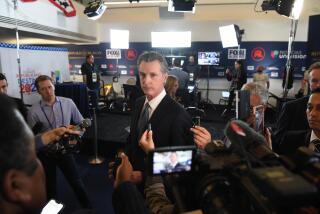A woman who savors a fine whine
- Share via
The temperature was close to zero Monday as I left the house to buy Sarah Palin’s memoir, “Going Rogue: An American Life.” The book was almost impossible to find in Anchorage before its official release Tuesday. The salesman who finally sold me one asked me to promise I wouldn’t reveal his identity if he sold me a pre-publication copy.
I made the pledge and put down my money. I’ve written about Palin since she ran for governor in 2006, interviewed her, moderated campaign debates in which she participated. I wanted to see what she’s like in prose.
In “Advertisements for Myself,” Norman Mailer admitted “a desire to inflict my casual opinions on a half-captive audience.” That’s what Palin has done in her 400-plus-page advertisement for a woman who, at age 45, seems to have permanently attached the word former to her name -- former beauty queen, former mayor of Wasilla, former governor of Alaska, former Republican vice presidential nominee.
Palin is now beginning a book tour on which she will do what she does best: draw crowds, create controversy and stir up the conservative base. These things are almost certain to make her, like Mailer, a bestselling author. But they won’t make her the next president of the United States.
During the 2008 presidential campaign, Palin, an amateur as a candidate, became a professional victim, blaming others when encountering political turbulence.
Finger-pointing became second nature to her, and it shows in “Going Rogue,” just as it did when she returned to Alaska from the campaign and began feuding with legislators, reporters -- and members of the public who alleged she had committed ethical improprieties.
In many of the pages of Palin’s book, she portrays herself as an abused woman: It wasn’t that Palin was unprepared; it was that Katie Couric badgered her and showed bias throughout their widely watched interview. John McCain’s campaign staff censored her. Campaign director Steve Schmidt was callous and condescending. The national media -- in suits! -- swarmed Wasilla and in their haste and indifference made up stories about her.
Palin’s accounts of her childhood and early life can be charming. She was born into a loving family and married into another.
But there is a big something missing from Palin’s narrative: the voice of a leader.
The book made me think about another outsider’s political memoir, that of Robert M. La Follette of Wisconsin (1855-1925). He too was a provincial Republican of modest means who, as congressman, governor, senator and presidential candidate, ran as an outsider like Palin. In his 1913 autobiography, subtitled “A Personal Narrative of Political Experiences,” La Follette’s voice is clear, bold, unafraid and without the trace of a whine. He expects mockery, rejection and contempt from the other side, and sometimes disloyalty from those who said they would stand with him. But he was a leader who remained unfazed by storms of words and emotions, focusing instead on organizing and mobilizing people for the struggle.
Palin neither organizes nor mobilizes. There is no Palin movement -- or organization of any depth and substance. There is no Palin philosophy beyond bromides about smaller government, the evils of abortion and the dangers of popular culture (which, right this moment, is making her a rich woman). While she easily won election as governor of Alaska in 2006, her victory was built largely on her fresh, attractive face and her predecessor’s unpopularity.
In “Advertisements for Myself,” Mailer confides -- in the first sentence, no less -- that he has been running for president “in the privacy of my mind, and it occurs to me that I am less close now than when I began.” Palin is keeping her thoughts about seeking the presidency private, but clearly, her stature as a leader has been in steady decline since McCain introduced her as his running mate. The more she advertises herself -- selling books, appearing in television interviews, making speeches -- the greater the proof she is not qualified for any title higher than the “formers” she has accumulated.
More to Read
Sign up for our Book Club newsletter
Get the latest news, events and more from the Los Angeles Times Book Club, and help us get L.A. reading and talking.
You may occasionally receive promotional content from the Los Angeles Times.










